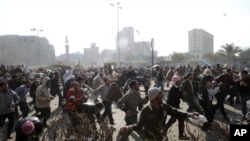Protests in Cairo raged on deep into the night as supporters of President Hosni Mubarak and those calling on him to step down continued to clash violently in the streets near Tahrir Square, killing three people and leaving more than 600 injured. The sudden shift from a largely peaceful push to remove Mr. Mubarak from office to chaotic clashes in the street has deepened uncertainty about what will come next for Egypt.
President Hosni Mubarak's announcement that he will not run again for office has done little to squelch the cries from the public for him to step down immediately. Add to that the appearance Wednesday of pro-Mubarak supporters and violent clashes in the streets, and it has become increasingly difficult to predict what will happen next.
Larry Goodson is a professor of Middle East Studies at the U.S. Army War College:
"I think what he’s [Mr. Mubarak] trying to do is brandish a stick along with this carrot that he’s already put out there," said Goodson. "From his point of view, naturally, it’s very reasonable. Now from the protesters’ point of view - and the history of these things in different places is very clear - that once a regime starts to crack, the protesters are all over it. They're like sharks when blood is in the water. Then they really want to push him out."
Isobel Coleman, a senior fellow with the Council on Foreign Relations, says the sooner there is a move toward a transitional government in Egypt the better.
"I think that at this point, the protesters really will accept nothing less than Mubarak himself stepping down and assurances that he and his son are both out of the running and some type of process, that is delineated, to get from where they are now to more free and fair elections," said Coleman.
Chaos engulfed Cairo on Wednesday as protesters battled with stones, fists and clubs. Fires set off by Molotov cocktails burned at various locations late into the night. Although the military and police largely stood aside, army vehicles were seen trying to separate the rival demonstrators.
Ed Husain, who is also a senior fellow with the Council on Foreign Relations, says he fears things will only get worse in Egypt before they get better.
"[Not] just today's developments, but also tomorrow's developments and I think more worringly, if the current trend continues, what will happen on Friday after Friday prayers when millions will gather from across the country, across Cairo indeed and then come out mosques," said Husain.
And yet, if and when the situation is resolved, and if protesters get what they are demanding, it is still very unclear what will come after that.
"Even if we have a change of the president of Egypt. Right at this point it doesn't look like there is going to be a total regime change," said Scott Stewart.
Stewart is the vice president for tactical intelligence at the private intelligence firm Stratfor. He says that while we have yet to see the military flex its muscle, it is working to ensure that it maintains its grip on control.
"The military is still going to maintain its position of influence and power," he said. "And really economic power, they have a considerable amount of economic power there in Egypt as well. So at this point, it doesn't look like the military is going to relinquish that control and it seems like they've been holding back at times in order to put pressure on Mubarak to step down."
Some Middle East analysts argue that at present, the two best organized groups in Egypt are the military and the Muslim Brotherhood. The situation with Egypt's very broad-based opposition movement is less clear.
Isobel Coleman says that with the opposition, there is no one who really has a big broad national standing.
"I think what you're seeing really, right now, is a bit of a power vacuum, certainly among the opposition," she said. "That makes the unknown all that more worrying."
Some Middle East analysts add that depending on what happens next, it is possible that in the short term, the military itself may become the ultimate arbitrator in Egypt to help it remain a secular Arab state.
Chaotic Clashes in Cairo Deepen Uncertainty Over Egypt's Future
- By Bill Ide












